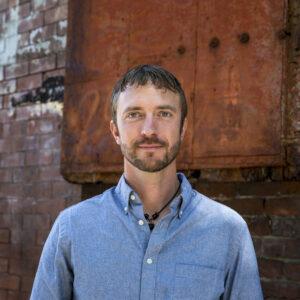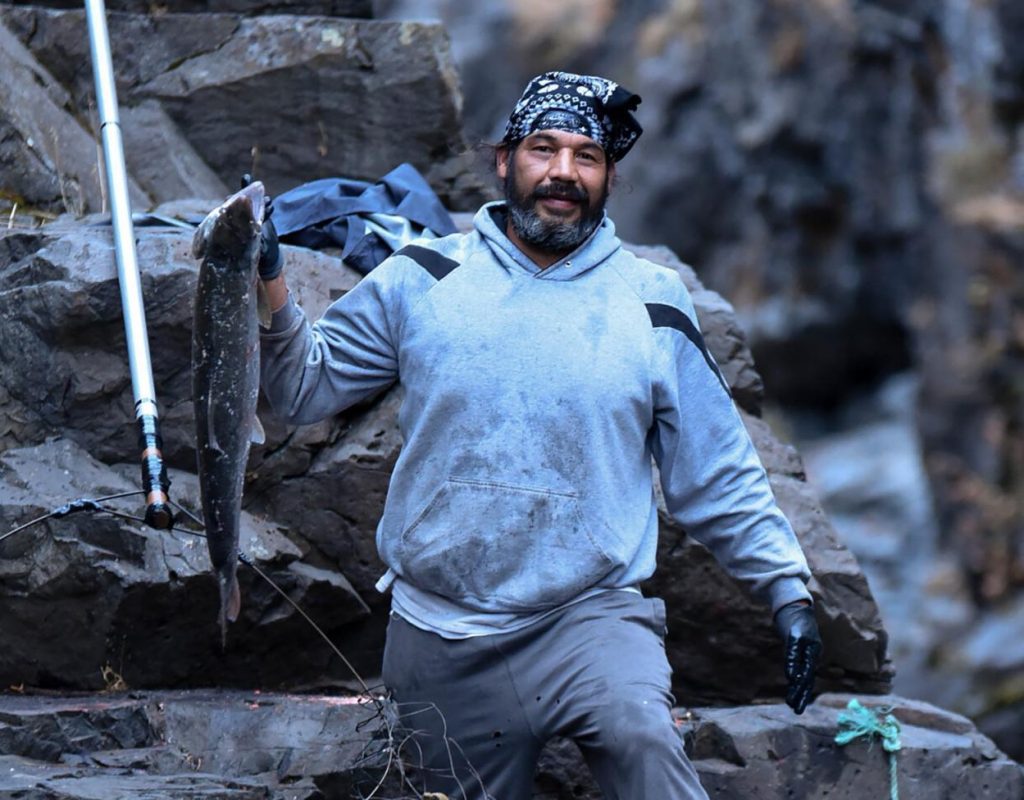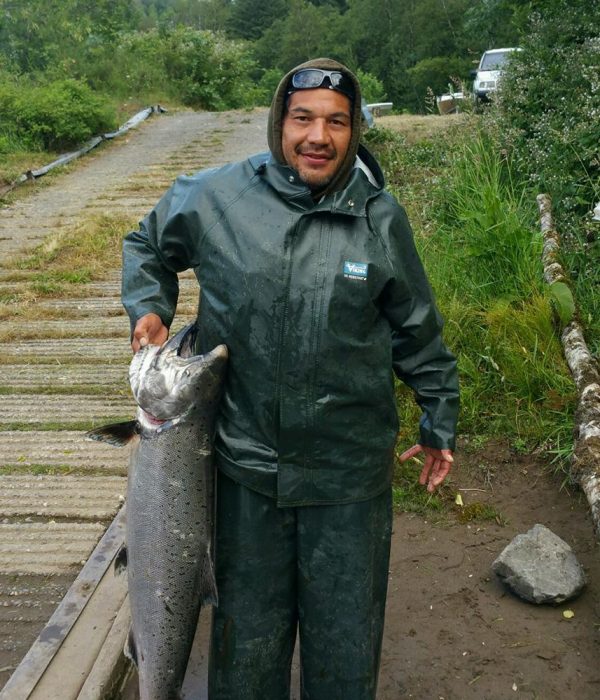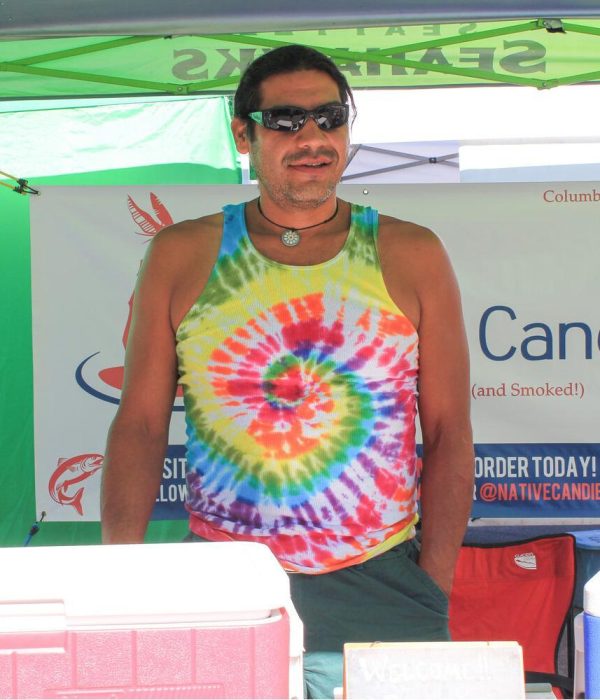
Fisheries & Food Systems Program Manager
William Spoonhunter, co-owner-operator of Native Candy, catches salmon with a dip net. Photo credit: Sarah Schu
William Spoonhunter (Yakama) and Christina White (Caddo) are the owner-operators of Native Candy, a seafood business that sells quality fresh and smoked salmon at farmers’ markets in Portland, Ore., Seattle, Wash., and throughout the Columbia Gorge, as well as from their storefront in Bingen, Wash.
Ecotrusters Tyson Rasor, Teresa Gaddy, and Emilie Chen talk with Will and Christina about the journey of their business, their vision and community impact as Indian Candy grows, and the inextricable connection between salmon and the Native people of the Pacific Northwest.
Our thanks to Sarah Schu for providing images to this blog post.
Tyson: How did you get involved in fishing?
William: I grew up wanting to know how to catch a fish. There is a lot that goes along with it. It’s expensive; you have to buy a lot of equipment, a lot of lures, fishing tackle, fishing poles. I think that’s what keeps a lot of people away. But for me, it just was in my heart. I think it’s genetics.
Christina: He tells me stories of him trying to fish out of whatever ponds or anywhere in his backyard. And this is something that’s been in his family line for a long time. I know that he’s being modest, but his aunts and uncles fought for the treaty right to fish. They were incarcerated and tear gassed to be able to maintain this right to fish. It runs deep for his family line and for his people. They’re a Salmon People.
“
There’s a lot from his family that he draws upon.
—CHRISTINA WHITE
William: The question I have for myself is, “Why wasn’t I taught when I was young?” I didn’t always know how to catch a fish. I had to humble myself and ask somebody what their secrets are. It’s not easy to catch a fish. It’s a hard way of life to be down here on the river. So a lot of fishermen don’t make it. For me, it wasn’t always easy, especially financially. And sometimes if I caught a salmon, I had to ask myself if I wanted to sell it or if I wanted to eat it.
I see it today, especially with COVID. A lot of the fishermen that are down here—they’re getting help from Columbia River Inter-Tribal Fish Commission and the tribes; they’re bringing in food and masks. So I’m witnessing that. And I know how hard it is.

William Spoonhunter with a fresh-caught fish. Photo credit: Sarah Schu
Tyson: Did you have a person or a teacher or a mentor who guided you?
William: Well, everybody’s an expert. All the Yakamas are experts. They’ve got their own little tricks. One year, it was really hot, and the fish, they just weren’t biting. But this one guy—he kept coming every weekend, and he’d catch 6 or 8 or 10 salmon every day. I was helping him land and net his fish, and after about the third week, I asked him. And he told me—he gave me his little mix. I caught my first salmon that year.
Christina: He’s down there all the time and paying attention. I think that’s the biggest teacher. He also has his aunties. His aunties are food gatherers, and they taught us how to filet a fish. Maybe it’s normal to Will because he’s been around that, but me, coming from outside that—there’s a lot of traditional ecological knowledge. There’s a lot from his family that he draws upon.
Tyson: Talking about your seafood business, what are your dreams, goals, or vision that you have for Native Candy?
William: Just being able to do what I love and continue to do what I love. Being able to help others in our community. Being able to have the things that I need to be out there, safe, and come back safe. My big dream is to expand to the mouth of the Columbia and tap into that fishery, not just have to wait for salmon to show up in the springtime. I wanna see the business become something I can pass on to my children.
“
We have a lot of returning customers, and they just tell us this is the best fish that they’ve ever had.
—WILLIAM SPOONHUNTER
Christina: In terms of uplifting his tribal community and mentoring youth—those are things that Will just does with his business. He doesn’t even really recognize the profound impact that it is having.
Tyson: Can you talk a bit more about the community work you are doing?
Christina: Yeah, we just submitted a grant to bring some tribal members, including youth, to witness tribal fishing practices and to learn how to preserve their own salmon. The grant funds will address a few issues: One issue is that there’s kind of a monopoly with fish buying down on the river. The fishermen are paid pretty suboptimal prices compared to what the market price for salmon is. The price fishermen are paid is held low, and all the fish buyers manage that together. What Will does, inadvertently, is he usually pays more for that salmon. One thing that we wrote into the grant was to pay a better price to the tribal fishermen who are offering their knowledge.
The second thing that we’re addressing is being able to provide that cultural knowledge to youth or other tribal members who are interested in fishing but maybe haven’t had the exposure or don’t know anyone that can teach them.
The third thing is the food system. Because salmon and other traditional foods for the Yakama have been highly commodified, and they’re highly valued in the mainstream economy, some of that salmon has moved out of the hands of elders and other tribal peoples that need it. The majority of them live at or below the poverty line. So we’re looking to enhance food sovereignty, especially for the elders in the tribal community. The tribal members that participate in the preservation of the food would take half of what they preserve and that would be distributed as donations to tribal elders who are in need of those healthy, medicine foods.
“
They sacrificed themselves for their right to fish. People say that happened in the past, but the effects of that are still very prevalent today.
—CHRISTINA WHITE
We have always operated on the belief that if people want this, we want to be able to provide it for them. I think that speaks to food access. Even if people can’t necessarily afford the price, they could still be able to have this food as medicine. It’s important to help people understand the importance of eating local and how that supports our local environment.
Tyson: What have been the barriers and challenges you’ve faced along the way to achieve your vision?
William: The challenges have been not knowing your rights, not knowing the laws. There’s information out there, but it’s withheld. I didn’t know the definitions and the meanings behind a lot of the reasons why these laws are in place for tribal fishermen and for businesses. To sell fish down by the river, you have to be a tribal member to sell fish. And to have Christina sell my fish without being an enrolled tribal member was probably one of the biggest obstacles.

William Spoonhunter. Photo courtesy of William Spoonhunter and Christina White.
Not having a business background was another barrier. We started taking business classes, getting certifications like food handlers’, and trying to comply with commercial standards so that we can provide a premium product. I’ve had to learn to manage my own expenses. For myself and probably for a lot of people, “taxation” is a scary word. With our fishery being tax exempt, there’s a lot of uncertainty. There’s just a lot of gray area for us.
Christina: To add to that, I think one of the biggest challenges is overcoming hundreds of years of oppression of the Native peoples of this area. Due to the Homestead Act of 1862, Native peoples were not considered US citizens and not able to own property until 1924. So you’re talking about 80 years where non-Natives came and appropriated land along the Columbia River. The Native people here were physically barred from fishing or hunting, even though their treaty rights allowed them to do that. And then, not only were their tribal lands appropriated, but their children were also taken away and sent to boarding schools. You have cultural loss there. And then the Fish Wars in 1970: that’s when tribal members exercised their treaty right to fish and were abused by the Washington Department of Fish and Wildlife. They sacrificed themselves for their right to fish. People say that happened in the past, but the effects of that are still very prevalent today.

William Spoonhunter at a farmers market. Photo courtesy of William Spoonhunter and Christina White
Tyson: What are you learning from the people whose fish you provide?
William: We have a lot of returning customers, and they just tell us this is the best fish that they’ve ever had. And we get a lot of thank yous. I’ve had store-bought salmon before—wild-caught from Alaska—and never again. But I had to try it. And then I try this fish, and there’s a difference. It’s good medicine.
Christina: We get a lot of “this is the best fish I’ve ever had in my entire life”—literally that. But it is. It is the best fish I’ve ever had in my life.
I think more and more people are interested in the story behind the salmon they’re eating. And that’s really important because a lot of people don’t know what it actually takes to catch a fish. It just adds so much more value and richness to the experience of eating the fish, if you know any part of the story behind how that salmon got to your table. When you buy a salmon from the store, there’s not a lot of information about where it came from, whether a tribal person caught this fish, handled this fish, or cut it using a tribal traditional method.
“
To me, that’s powerful, being able to have our treaty rights, to be out there doing what we’ve been doing for thousands of years.
—WILLIAM SPOONHUNTER
If the tribal peoples of this region didn’t cultivate the salmon populations and support the ecology, the salmon wouldn’t be here for people to enjoy today. A lot of environmental scientists are drawing upon traditional ecological knowledge now to be able to preserve the salmon populations and other foods in the region. So I think that Indigenous peoples of this region are the most critical part of the Pacific Northwest ecology.
Teresa: How do you feel when you’re out on the water, when you’re fishing?
William: I feel at peace. It’s something that I can always be thankful for, because I wasn’t always able to do it. There’s certain times when tribes are the only ones out there fishing. To me, that’s powerful, being able to have our treaty rights, to be out there doing what we’ve been doing for thousands of years.
Learn more about Native Candy through their website and follow their Instagram.
Our thanks to William Spoonhunter and Christina White for their time with this interview and Sarah Schu for the photos provided.
Native Candy was formerly known as Indian Candy. On October 6, 2021, we edited this blog post to reflect their updated business name.

